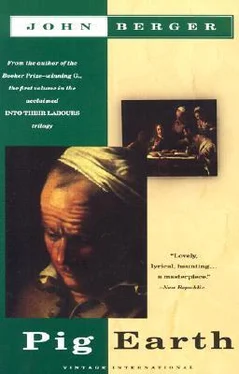At the frontier the douanier asked her whether she had anything to declare. She looked blank. What have you got with you? he asked. Some morels, she said. I’ll sell them to you, if you offer me a good price!
After two hours’ searching, she found the market. She walked through it to see whether others were selling the same goods as she had brought. There were no other violets, and she thought she had misread the price of the dandelion leaves. They cost two hundred for a hundred grams. Two thousand a kilo! She understood better the wealth of the city of B.… The morels were selling at five thousand a kilo! She chose a corner in the shade, put her baskets down either side of her feet and waited for customers to come and buy. She stood waiting all morning. At midday she saw all the other traders packing up their stalls. She had sold nothing. She had not opened her mouth.
On her way back to the frontier she went into a café to ask for a glass of water. Nowhere in the streets had she seen a pump or a fountain. The proprietor peered into her basket of morels. He picked one up without a word, turned it in his fingers.
I’ll give you a thousand for the basketful.
There are two kilo there. You can weigh them.
I don’t need to.
They’re selling for five thousand a kilo in the market, she said, scandalised.
He shrugged his shoulders and turned away. She stared at him, her chin level with the top of his zinc bar. Looking over his shoulder, he opened his silent mouth and guffawed with laughter.
How much do you weigh yourself! he asked. You could throw yourself in for good measure! I’ll give you twelve hundred.
She saw that she had to accept the price, it was her last chance.
It took her a year to find her way about B.… In Buenos Aires I saw peasants newly arrived in the city, and all of them had the same air of confusion and extreme timidity. Many of them never got over it. I and the Cocadrille did. Of the two of us, she was the quicker. At home, in the village, it is you who do everything, and the way you do it gives you a certain authority. There are accidents and many things are beyond your control, but it is you who have to deal with the consequences even of these. When you arrive in the city, where so much is happening and so much is being done and shifted, you realise with astonishment that nothing is in your control. It is like being a bee against a window pane. You see the events, the colours, the lights, yet something, which you can’t see, separates you. With the peasant it is the forced suspension of his habit of handling and doing. That’s why his hands dangle out of his cuffs so stupidly.
Month by month the Cocadrille learnt where she could sell each item in the city, each item which, according to the season, she scavenged from the mountains: wild cherries, lilies of the valley, snails, mushrooms, blueberries, raspberries, wild strawberries, blackberries, trolles , juniper berries, cumin, wild rhododendra, mistletoe.
You have to understand that everything you watch in the city is as unimportant as a game. Everything which impresses you about the city is an illusion. It is not easy. To be impressed and unimpressed at the same time! What really happens in a city is hidden. If you want to achieve anything it must be arranged in secret.
She went to cafés, never missing a wink or a nod, never failing to remember a quickly suggested address. She bought a map of the city and on it she marked, with the flowing capital letters which André Masson taught us all, the addresses of her customers.
You’d have to pay to see that map! she cawed.
I poured out the last of the wine.
Do you remember where the cumin grows on the path to the alpage? I bring down a pailler full on my back and I let it dry there in the stable. I put newspapers underneath for the seeds to fall on to. I can sell a hundred grams of cumin seed for one thousand, five hundred!
As she named the price, she tapped with all the fingers of one hand on the edge of the table, and the spoon rattled in her plate. She discovered that there was no need to pay for a ticket to travel to B.… She could stop lorries and cars on the road and they would take her. She went to the city twice a week. All the other days of the year, when there wasn’t snow, she scavenged from dawn to dusk.
Drivers came to know me. She touched the back of my hand again. Sometimes they tried to take liberties but they never tried twice.
Réné, the electrician, picked her up one day.
As far as the frontier? she asked.
Réné nodded and she got in the back. He saw her in the driving mirror. It was a new car he had just bought and she sat in the very centre of the shining back seat, bolt upright with her sack on the floor. Réné nudged the apprentice sitting beside him.
Have you heard the story of the he-goat who went mad?
No.
He belonged to a farm where, years before, a cock laid an egg.
How’s that?
The peasant’s wife was certain because one morning she went into the chicken house and there was the cock on one of the hens’ boxes, making laying noises. She shooed him off and there was an egg! Saying nothing to her husband, she took the egg and buried it in the dung heap. Four weeks later …
He was interrupted by the noise of something crackling. He turned around. The Cocadrille was lying back with her legs and boots in the air. On the seat beside her, several egg yolks were running down the upholstery. The scraps of newspaper from which she had unwrapped the eggs were still on her lap.
Finish your story, she said. What did the Cocadrille do to the billy-goat?
Réné drove on in silence. When the douanier at the frontier asked whether they had anything to declare, the Cocadrille leant forward and said:
The two men here have a dozen broken eggs to declare.
Réné shook his head and winked at the douanier.
You can count them there on the floor, she insisted, twelve, and they haven’t paid me for them yet. A car like this, and they pretend they can’t pay an old woman for a dozen eggs!
How did they break? asked the douanier, laughing.
A billy-goat rolled on them … she explained, and, without a thank-you or a good-bye, the Cocadrille got down from the car and followed the tram-lines.
She learnt that money did not have the same value on both sides of the frontier. For everything bought, there was a cheap side and an expensive side. She learnt that it was foolish to bring money back; less foolish to bring back what she could sell expensively on her side.
We are surrounded by natural frontiers: snow, mountains, rock walls, rivers, ravines. For centuries we have also lived near an invisible political frontier. Where exactly it runs, changes according to the force of foreign governments and armies. This frontier divides the rich from the poor, and it is the easiest of all to cross. The threat of being flogged, of exile, of execution, of being sent to the galleys, has never deterred men or women from crossing it and smuggling. Many smuggled alone; some formed bands like small armies. The names of the leaders of these bands she knew by heart: Le Grand Joseph, Le Dragon, La Danse à l’Ombre, the great Louis Mandrin who was executed at V.…
What have you got to declare today, Grandma?
Down to there, nothing, she pointed to the pit of her stomach, underneath there is a present for any young man who wants it!
Besides the map which she would not show me, she kept an almanac. In it, each year, she wrote down the date of the month when a crop in a given place was ready for picking. Five days a week, for she was also out scavenging on Sundays, she combed the countryside. Like a crow, she noticed everything.
She knew not only paths but countless clearings, assemblies of rocks, streams, fallen trees, protected hollows, fissures, crests, slopes. It was only for the city of B … that she needed a map. She knew exactly where to crawl along the border of the forest to find wild strawberries. She knew under which pine trees the cyclamen grow, the tiny cyclamen which are called pain de porceau because wild boar eat their roots. She knew on which distant precipitous slope the first rhododendra flower. She knew by which walls whole settlements of snails come out of hiding. She knew where the yellow gentians with the largest roots grow on the mountainside where the soil is least rocky so that digging them is a little easier. She worked and scavenged alone.
Читать дальше












